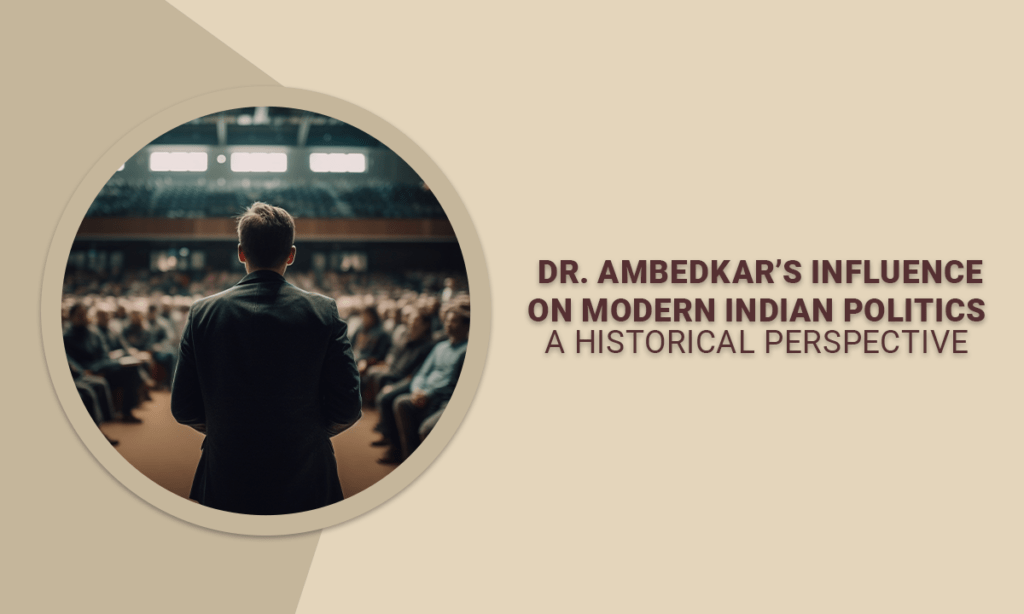Introduction
Dr. B.R. Ambedkar, known as the “Father of the Indian Constitution,” was instrumental in defining modern Indian politics. His remarkable journey from being a marginalised Dalit to one of India’s most influential leaders is a testament to his enduring legacy. This post discusses Dr. Ambedkar’s life and his enormous impact on modern Indian politics.
Early Life and Education
Born on April 14, 1891, in the town of Mhow in British India (now in Madhya Pradesh), Dr. B.R. Ambedkar was a member of the Dalit community, formerly known as “Untouchables.” He faced discrimination and social ostracisation from a young age, which fueled his determination to fight for the rights of marginalised communities.
Despite the immense challenges, Dr. Ambedkar devoted himself to education. He obtained degrees in economics and law from prestigious institutions in India and abroad, including the University of Mumbai, Columbia University in the United States, and the London School of Economics. His academic achievements were groundbreaking for a Dalit individual in that era, highlighting his perseverance and intellectual prowess.
Championing Dalit Rights
Dr. Ambedkar’s early activism centred around advocating for the rights of Dalits, who suffered severe social and economic discrimination in Indian society. He believed political power was the key to uplifting the oppressed communities and fought relentlessly to secure their rights.
The Mahad Satyagraha of 1927 was a pivotal moment in Dr. Ambedkar’s journey. He led a peaceful protest demanding access to public water sources for Dalits, challenging the age-old caste-based segregation. This event marked the beginning of his public struggle for social justice and gained nationwide attention.
Dr. Ambedkar’s Role in the Poona Pact
One of the most significant episodes in Indian politics involving Dr. Ambedkar was the Poona Pact of 1932. This pact was a result of negotiations between Dr. Ambedkar and Mahatma Gandhi, representing the interests of the Dalits and the Congress Party, respectively.
The British government had introduced separate electorates for Dalits as a means to protect their political rights. However, Gandhi was concerned that this would further fragment Indian society along caste lines. After Gandhi went on a hunger strike to put pressure on the Indian government, Dr. Ambedkar agreed to the Poona Pact, which reserved a certain number of seats in legislative bodies for Dalits without creating separate electorates.
Drafting the Indian Constitution
Dr. Ambedkar’s greatest contribution to modern Indian politics was his role as the Chairman of the Drafting Committee of the Indian Constitution.
The Indian Constitution, adopted on January 26, 1950, incorporated several key principles advocated by Dr. Ambedkar. Some of them are the abolition of untouchability, provisions for affirmative action (reservation) for marginalised communities, and the guarantee of fundamental rights to all citizens regardless of caste or creed. The Constitution laid the foundation for a democratic and egalitarian India, guided by the principles of liberty, equality, and fraternity.
Dr. Ambedkar’s Advocacy for Women’s Rights
In addition to Dalit rights, Dr. Ambedkar also advocated for women’s rights. He was a strong supporter of gender equality and was instrumental in the inclusion of provisions for gender justice in the Indian Constitution. The Constitution provides gender-neutral laws and guarantees equal rights for women in all aspects of life.
Final Words
Dr. B.R. Ambedkar’s influence on modern Indian politics cannot be overstated. His tireless efforts to eradicate social discrimination and promote social justice continue to shape the political discourse in India. His contributions to the Indian Constitution and his relentless advocacy for marginalised communities have left an indelible mark on the nation’s history.
People Also Read: Legacy and Cultural Impact: How Dr. Ambedkar Lives on Today
